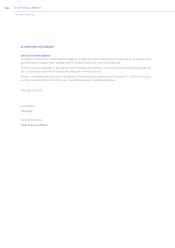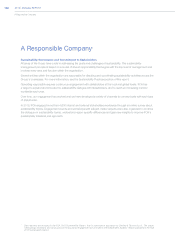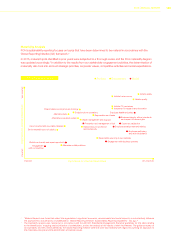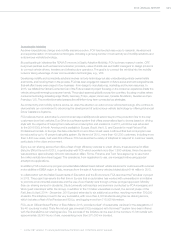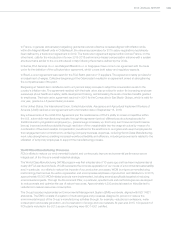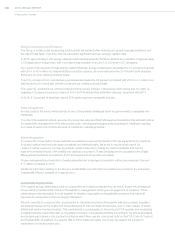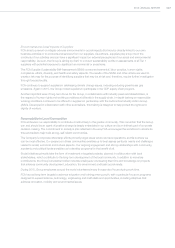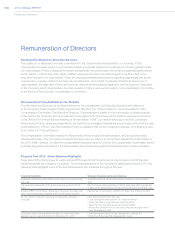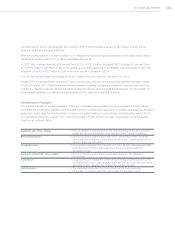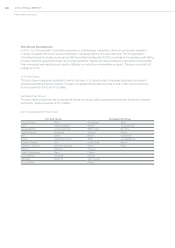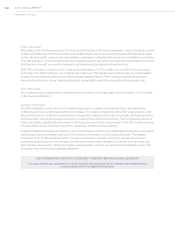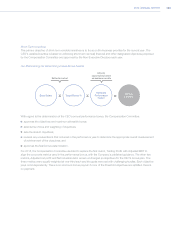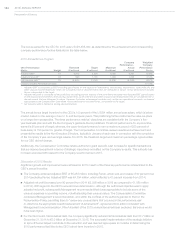Chrysler 2015 Annual Report Download - page 115
Download and view the complete annual report
Please find page 115 of the 2015 Chrysler annual report below. You can navigate through the pages in the report by either clicking on the pages listed below, or by using the keyword search tool below to find specific information within the annual report.
2015 | ANNUAL REPORT 115
In France, in general, annual salary bargaining granted structural collective increases aligned with inflation while,
within the Magneti Marelli units in Châtellerault, the reference parameters for 2015 salary negotiations had already
been defined by a trade union agreement in 2012. The trade union agreement signed within Comau France, on the
other hand, calls for the introduction of a new 2015-2018 performance-based compensation scheme with a system
structure that is similar to the one introduced in Italy following the scheme defined by the CCSL.
In Serbia, FCA Services d.o.o. and Magneti Marelli d.o.o. in Kragujevac have come to an agreement with the trade
union for the definition of the collective labor agreement, which covers both salary and regulatory aspects.
In Brazil, a union agreement was reach for the FCA Betim plant and 17 suppliers. The agreement mainly provides for
an adjustment of wages. Collective bargaining at the Goiana plant resulted in an agreement aimed at strengthening
the competitiveness of the plant.
Bargaining at Teksid Hierro de Mexico led to a 5 percent salary increase to adapt the remuneration levels to the
country’s inflation rate. The agreement reached with the trade union also provides for action for increasing employee
awareness about health and safety, skills-development training, and increasing the levels of certain benefits granted
to employees. The trade union agreement reached in 2015 for the Comau site in San Martin Obispo, which is valid for
one year, granted a 4.5 percent salary increase.
In the United States, the International Union, United Automobile, Aerospace and Agricultural Implement Workers of
America (UAW) reached a new agreement with a termination date of September 15, 2019.
Key achievements of the UAW-FCA Agreement are: the maintenance of FCA’s ability to remain competitive within
the U.S. automobile manufacturing industry through the agreement period; different pay structures/payouts for
traditional and in-progression employees (i.e., general wage increases, up-front lump sum bonus and performance
bonus); improved workforce stability through resolution of the unsustainable two-tier wage structure by means of a
combination of fixed and variable compensation; investment in the workforce to recognize and reward employees for
their engagement and commitment to achieving Company business objectives, including World Class Manufacturing;
work rules strengthened, enabling increased workforce flexibility and efficiency, including improvements related to the
utilization of temporary employees to support the manufacturing process.
World Class Manufacturing Processes
FCA’s efforts to reduce our environmental footprint and continuously improve environmental performance are an
integral part of the Group’s overall industrial strategy.
The World Class Manufacturing (WCM) program was first adopted about 10 years ago and has been implemented at
nearly all FCA plants worldwide. WCM represents the concrete application of our model of environmental sustainability
and, in particular, our efforts to reduce the impacts of our production processes. WCM is a rigorous manufacturing
methodology that involves the entire organization and encompasses all phases of production and distribution. In 2015,
approximately 65,000 WCM-related projects were implemented, including several specifically targeted at reducing
environmental impacts. Through the Environment Pillar, in particular, specific tools and methodologies are developed
to reduce waste and optimize the use of natural resources. Approximately 4,300projects based on this pillar led to
reductions in natural resources consumption.
The Group has also implemented an Environmental Management System (EMS) worldwide, aligned with ISO 14001
standards. The EMS consists of a system of methodologies and processes designed to prevent or reduce the
environmental impact of the Group’s manufacturing activities through, for example, reductions in emissions, water
consumption and waste generation, and conservation of energy and raw materials. At year-end 2015, 100 percent of
FCA plants included in the 2013 scope of reporting were ISO 14001 certified.



